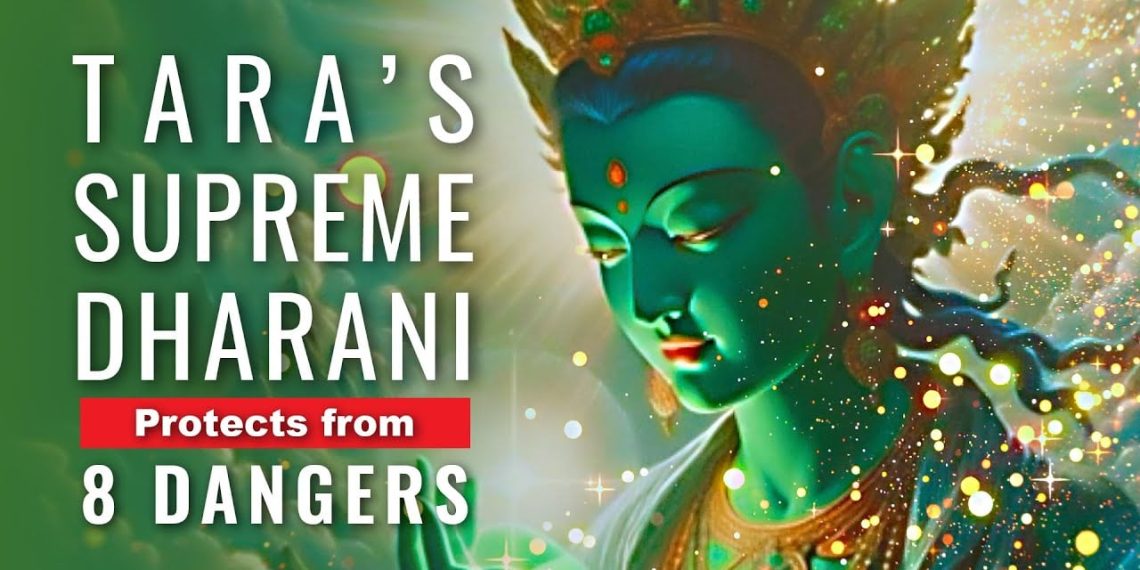
Tara’s Great Dharani from The Noble Sūtra Tārā Who Protects from the Eight Dangers is the Supreme Protective Dharani. Here, we chant in the original Sanskrit. (TURN ON CC or SUBTITLES for CHANT-ALONG. No Permission is required to chant this powerful Sutra Dharani.)
Green Tara Great Dharani from Sutra chanted by Buddha Weekly band in Sanskrit:
The supreme and perfect Dharani from the Āryatārāṣṭaghoratāraṇīsūtra are the sacred words of Tara Herself. This is the most powerful and protective of the Great Dharanis Tara, as it includes praise, activities and supplications in one great Dharani:
oṁ nama āryāvalokiteśvarāya bodhisattvāya mahā sattvāya mahā kāruṇi kāya
tadyathā
oṁ tāre tuttāre ture sarva duṣṭān praduṣṭān mama kṛte jambhaya stambhaya mohaya bandhaya hūṁ hūṁ hūṁ phaṭ phaṭ phaṭ svāhā
nama āryāvalobhayā narā bodhisattvā mahā sattvāni adhiṣṭhānā dhiṣṭhite mama sarva karmā varaṇa svabhāva śuddhe viśuddhe śodhaya viśodhaya hūṁ phaṭ svāhā
(TRANSLATION BELOW)
BAND: BUDDHA WEEKLY
MAIN VOCAL: Hrishikesh Sonar
MUSIC AVAILABLE Through your favorite Music Streaming Service: Spotify, Apple Music, iTunes, Instagram/Facebook, TikTok & other ByteDance stores, YouTube Music, Amazon, Pandora, Deezer, Tidal, iHeartRadio, Claro Música, Saavn, Boomplay, Anghami, NetEase, Tencent, Qobuz, Joox, Kuack Media, Adaptr, Flo, MediaNet
SPOTIFY: https://open.spotify.com/album/6sQDkyflvLo22EIqwrmGtw
APPLE MUSIC: https://music.apple.com/us/album/taras-protection-dharani-ep/1780594244
TRANSLATION and COMMENTARY:
The Dharani begins with the opening Praise to Avalokiteshvara, which is —
oṁ nama āryāvalokiteśvarāya bodhisattvāya mahāsattvāya mahākāruṇikāya
The opening of the dhāraṇī is a standard homage to Avalokiteśvara. Tara is transmitting the mantra in the Sutra at the request of Avalokiteshvara to an audience of Bodhisattvas and Sangha.
This homage translates as:
“oṁ! Homage to Noble Avalokiteśvara, the bodhisattva mahāsattva, the great compassionate one!”
THEN THE DHARANI BEGINS WITH
tadyathā
Tadyathā means “it is like this,” or “thus it is” indicating that what follows is the actual Dharani.
NEXT IS THE REQUEST FOR ACTIVITIES FROM TARA:
oṁ tāre tuttāre ture sarvaduṣṭān praduṣṭān mama kṛte jambhaya stambhaya mohaya bandhaya hūṁ hūṁ hūṁ phaṭ phaṭ phaṭ svāhā
This is a request to Tārā to dispel obstacles through her supreme activities. It is often used as a stand-alone Dharani. This translates as:
“oṁ! Deliverer! Savior! Swift One! Crush, suppress, confound, restrain all the wrong and evil beings for me! hūṁ hūṁ hūṁ phaṭ phaṭ phaṭ svāhā!”
SUPPLICATION
After the Activity invocation, is the supplication or prayer:
nama āryāvalobhayā narā bodhisattvā mahāsattvāni adhiṣṭhānādhiṣṭhite mama sarvakarmāvaraṇa svabhāvaśuddhe viśuddhe śodhaya viśodhaya hūṁ phaṭ svāhā
The final segment of this dhāraṇī is a supplication or request to Tārā to purify all of our obscurations and negativities. This can be translated as:
“Homage to you (Tara), empowered with the blessing of Noble Avalokita, the great bodhisattva mahāsattva! Purify, completely purify, cleanse, and completely clean all my karmic obscurations! hūṁ phaṭ svāhā!”
Mother Tara protects us from the Eight Dangers or Fears, including diseases and epidemics. The Eight Dangers and fears include all dangers and fears: 8 outer, 8 inner and 8 secret dangers.
This relates to the commentary teachings: 1. Outer, 2. Inner, and 3. Secret. The outer meaning of the eight fears are real fears experienced which are given in the Sutra by way of examples (for example “lion’s” representing wild animals” and “water” representing all dangers from the environment (flooding, typhoon, drought). The outer relates to the physical person and the fears presented in a physical material world.
The inner meaning relates to passions, ego and negative emotional characteristics. (we can say inner demons: for example, anger is considered to manifest as a “demon” or mara). The inner meaning relates to the mental world.
The secret meaning has to do with specific advanced Vajrayana teachings, commitments and so on — which help us transform these negative mental states into enlightened, or realized, states. For example, keeping the precepts and also the Vajrayana Vows (the vows to the Five Buddha Families.) The danger is, if we forget the precepts, we accumulate negative karma and obstacles. Five of the Eight are stated in the Five Buddha Families Vow, which is part of the Vajrayana or Vows.

